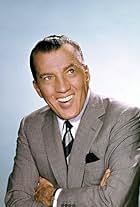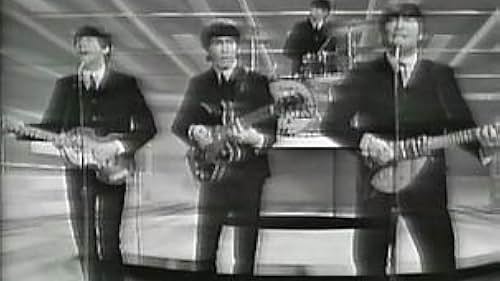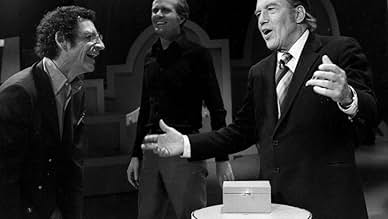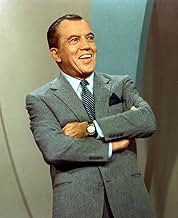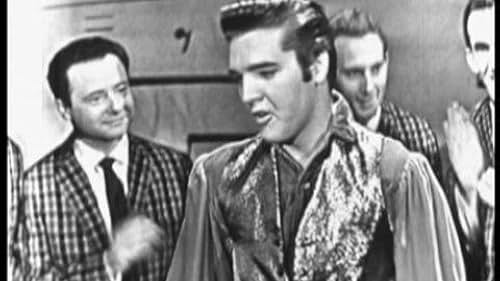Ed Sullivan(1901-1974)
- Producer
- Actor
- Writer
The beloved Impresario of TV variety from 1948 to 1971, Ed Sullivan originally made his name as a newspaper sportswriter, radio
broadcaster and theater columnist for the New York Daily News. His column focused primarily on Broadway shows and juicy items about its
stars. On the new medium of TV, however, he became a pioneer master of ceremonies and entertainment showman.
Edward Vincent Sullivan and his twin brother, Daniel (who died at age 2), were born to a modest Irish-Catholic family on September 28, 1901, in Harlem. A major athlete at Port Chester High School, he lettered in track, football, basketball and baseball. His first professional experience was his local The Port Chester Daily Item, a local newspaper for which he had written sports news while in high school. He joined the paper full-time after graduation. He would land subsequent jobs as a sports reporter, and then various news-related jobs with such papers as The Associated Press, The Philadelphia Bulletin and The New York Bulletin. A sport writer and (later) editor for The Evening Graphic in 1927, Sullivan took over the Broadway column for The News after Walter Winchell left. That position would last 42 years.
Hired in 1932 by the CBS network as a rival of radio commentator Walter Winchell, future radio stars introduced on Sullivan's program included Jack Benny. Sullivan made his film debut as himself in Mr. Broadway (1933), which he also wrote. His subsequent screenplay and story involvements included the screwy comedy There Goes My Heart (1938) and the Universal musical Ma! He's Making Eyes at Me (1940).
So successful was he as Masters of Ceremony at the Harvest Moon Ball at Madison Square Garden, CBS hired him to do The Ed Sullivan Show (1948) ("Toast of the Town") just as TV sets were becoming a home staple. The show, which balanced amazing novelty acts with singing and comedy talents, both legendary and up-and-coming, was broadcast from CBS Studio 50 on Broadway in New York City. In 1967 the studio was aptly renamed the Ed Sullivan Theater. Although Sullivan himself had zilch stage or camera presence and had a frustrating habit of forgetting performers' names as he was about to present them, audiences were completely taken by his charming idiosyncrasies and mellow, guy-next-door approach. He and the show became a resounding success for a staggering 23 years.
Sullivan had a knack for identifying talent and his Sunday night variety platform became a springboard for a number of top stars and groups, including comics Dean Martin & Jerry Lewis and singers Elvis Presley and The Beatles. He also was color blind when it came to talent, generously promoting a number of black crossover acts, such as The Supremes and other Motown artists, when few other TV shows would. Sullivan appeared as himself in such films as Bye Bye Birdie (1963), The Patsy (1964) and The Singing Nun (1966), among others. The irrepressibly stiff, hunch-shouldered emcee was unmercifully parodied by a parade of impressionists over the decades, including Will Jordan, John Byner and David Frye.
Following his cancellation in 1971, Sullivan was seen infrequently hosting variety specials. He died in his beloved New York of esophageal cancer in 1974, three years after the cancellation of his series. The father of one daughter, Betty, Sullivan's wife Sylvia (Weinstein) Sullivan, whom he married in 1930, died the year before.
Edward Vincent Sullivan and his twin brother, Daniel (who died at age 2), were born to a modest Irish-Catholic family on September 28, 1901, in Harlem. A major athlete at Port Chester High School, he lettered in track, football, basketball and baseball. His first professional experience was his local The Port Chester Daily Item, a local newspaper for which he had written sports news while in high school. He joined the paper full-time after graduation. He would land subsequent jobs as a sports reporter, and then various news-related jobs with such papers as The Associated Press, The Philadelphia Bulletin and The New York Bulletin. A sport writer and (later) editor for The Evening Graphic in 1927, Sullivan took over the Broadway column for The News after Walter Winchell left. That position would last 42 years.
Hired in 1932 by the CBS network as a rival of radio commentator Walter Winchell, future radio stars introduced on Sullivan's program included Jack Benny. Sullivan made his film debut as himself in Mr. Broadway (1933), which he also wrote. His subsequent screenplay and story involvements included the screwy comedy There Goes My Heart (1938) and the Universal musical Ma! He's Making Eyes at Me (1940).
So successful was he as Masters of Ceremony at the Harvest Moon Ball at Madison Square Garden, CBS hired him to do The Ed Sullivan Show (1948) ("Toast of the Town") just as TV sets were becoming a home staple. The show, which balanced amazing novelty acts with singing and comedy talents, both legendary and up-and-coming, was broadcast from CBS Studio 50 on Broadway in New York City. In 1967 the studio was aptly renamed the Ed Sullivan Theater. Although Sullivan himself had zilch stage or camera presence and had a frustrating habit of forgetting performers' names as he was about to present them, audiences were completely taken by his charming idiosyncrasies and mellow, guy-next-door approach. He and the show became a resounding success for a staggering 23 years.
Sullivan had a knack for identifying talent and his Sunday night variety platform became a springboard for a number of top stars and groups, including comics Dean Martin & Jerry Lewis and singers Elvis Presley and The Beatles. He also was color blind when it came to talent, generously promoting a number of black crossover acts, such as The Supremes and other Motown artists, when few other TV shows would. Sullivan appeared as himself in such films as Bye Bye Birdie (1963), The Patsy (1964) and The Singing Nun (1966), among others. The irrepressibly stiff, hunch-shouldered emcee was unmercifully parodied by a parade of impressionists over the decades, including Will Jordan, John Byner and David Frye.
Following his cancellation in 1971, Sullivan was seen infrequently hosting variety specials. He died in his beloved New York of esophageal cancer in 1974, three years after the cancellation of his series. The father of one daughter, Betty, Sullivan's wife Sylvia (Weinstein) Sullivan, whom he married in 1930, died the year before.
